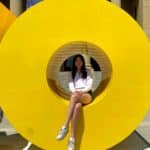Starting Small
Palo Alto, CA
2020, Junior, Creative Writing
What did I remember from that autumn ten years ago?
I remembered crushing dry leaves between my hands, feeling the rough edges scrape against my palm as fragments of red and yellow and brown fluttered to the cement. I brought my fingers to my face and inhaled the cool, earthy scent of my fingertips.
I remembered begging my mother for a little sister, someone to build sandcastles with on the small beach a few blocks behind our house. “Soon, baobei,” she said, using the Chinese term of endearment for a young child. “Soon.”
I remembered her cooking lobster in the kitchen, the smell of garlic butter wafting into my bedroom. She loved all seafood, but lobster most of all. I would watch her at the dining table, repeating the same odd ritual with each of the creature’s spindly legs: twist, rip, bite. Twist, rip, bite.
I remembered visits to the doctor, which grew more and more frequent as we neared Thanksgiving. The nurse looked me straight in the eye when she told me, “Congratulations, Rachel! You’re going to be a big sister soon!”
The last thing I remembered from that autumn was sitting cross-legged on the sand, humming the tune to a song only I knew. I was building a sandcastle with a single bucket made of pink plastic. Somehow, while my small hands were forming clumsy shapes out of the damp sand, I’d lost sight of the bucket. I searched everywhere for it to complete my sandcastle, finally catching a glimpse of hot pink being carried away by the waves over the horizon. When I came back, my sandcastle had suffered the same fate.
What I didn’t remember about autumn was what came after. I didn’t remember how, exactly, my mom stopped looking happy every time she went to the doctor’s. I didn’t remember when she began to cry in the middle of the night, waking up everyone who was too afraid to tell her to go back to sleep. I didn’t remember why she’d stopped eating lobster, but for some reason it was this change over all the others that made me want to know the answer.
She gave me an affectionate tap on the nose when I asked her. “No more fish,” she said simply. To her, all seafood could be categorized under the umbrella term “fish.” When I asked about my baby sister, she smiled sadly and said, “No more baby sister, either.”
As a kindergartener, I couldn’t comprehend her answer. Now it had been ten years and the truth was seared into my mind, almost from memory: my little sister had died from mercury poisoning. Though it was rare, the coal company nearby had been leaking mercury into the ocean as a byproduct of burning coal for the factories that depended on it. Our little seaside town relied on the profits from our coal, but at what cost? My mother’s locally sourced lobster actually contained levels of mercury high enough to kill, despite lobster being one of the safest seafood options to eat while pregnant.
My mother knew about overfishing, and maybe that was why she’d told me, “No more fish” like it was the simplest thing in the world. She was right, but it wasn’t that simple. What about the bigger picture? What about “no more mercury”?
My little hands, which used to build castles out of sand and crush dead leaves between their fingers, seemed too small to push back against the trajectory of the world. The news was everywhere: we were headed for disaster. If politicians and reporters and even passionate young teenagers with a far wider audience than I could ever hope to reach couldn’t fix our planet, what chance did I have?
But if there was one thing I’d learned from living in a tiny little town all my life, it was this: start small.
So I picked up a small pen and held it between my small fingers, hoping that everywhere small people like me were doing small things like this to change our big world. And just like that, I began to write.
Dear Martin & Co. Coal Company,
Let me tell you what I remember from that autumn ten years ago…
Works Cited
Mast, Laura. “Coal Ash Contains Lead, Arsenic, and Mercury – and It’s Mostly Unregulated.” Massive Science , 16 May 2018, massivesci.com/articles/coal-ash-water-health-hazard/.

Reflection
Reflection
Ironically, when I first read that the 2020 Ocean Awareness Contest theme would be "Climate Hope: Transforming Crisis," all I felt was despair. Our planet was going through a large-scale crisis like never before, and now we were expected to transform it? How could a group of people with no political or financial power reverse the effects of centuries of pollution? The oceans were simply too big, and we were simply too small. But then I read stories of people going on climate strikes, picking up trash on beaches, and writing letters to their local representatives, and I realized that that was what change was. Small did not equal hopeless; if a butterfly flapping its wings in Chicago could cause a tornado in Tokyo, then surely small people doing small things all over the world could turn the tides of climate change, both figuratively and literally. I hope that anyone who reads my story realizes just as I did that small actions can make a big difference, and is inspired to make such a difference in their own community. The Contest theme has given me hope to do whatever I can for our oceans and know that somewhere, someone else is doing the same.
